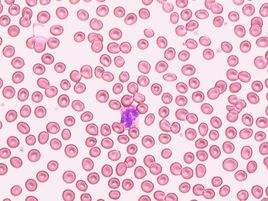(单词翻译:单击)
听力文本
This is Scientific American — 60-Second Science. I'm Christopher Intagliata.
Head up to the mountains, and if the steep trails don't slow you down, the thin air will. There's less oxygen up there—so strenuous activity can leave you dizzy, out of breath...or worse. But even though you're beat, biochemical processes are already busy at work, acclimating your body.
Scientists investigated those pathways in humans and mice. They found that exposure to low oxygen depletes stores of a red-blood-cell protein called eENT1. That's a good thing. Because now other substances that protect your body against low oxygen are free to rapidly accumulate and help the body adapt.
But here's the kicker—once the eENT1 protein goes away, it doesn't come back. Meaning red blood cells kind of 'remember' their altitude exposure. And that means if you hit the mountains again soon enough, you can acclimate faster than you did the first time. The findings are in the journal Nature Communications.

There is one caveat though. "The red blood cell lifespan is 120 days." Study author Yang Xia, a biochemist with the UT Health Science Center in Houston. "So the longer you stay at sea level before you re-climb to high altitude, then such memory will gradually disappear." So unless you're a frequent mountain climber—there's really no shortcut to acclimatization. Then again, there's no shortcut to the summit, either.
Thanks for listening for Scientific American — 60-Second Science Science. I'm Christopher Intagliata.
参考译文
这里是科学美国人——60秒科学。我是克里斯托弗·因塔利亚塔。
登山时,即使陡峭的小路没有让你减慢速度,那稀薄的空气也会减缓你的步伐。山上氧气稀少,剧烈活动会让你头晕、喘不过气来,甚至更糟。但是,即使你很累,但是体内的生物化学过程仍在紧张进行,目的是使你的身体适应环境。
科学家对人类和小鼠的生物化学过程路径进行了研究。他们发现,低氧环境会降解一种名为eENT1的红细胞。这是件好事。因为其他保护身体抵抗低氧环境的物质会迅速积累,帮助身体适应低氧环境。
但是有个问题,eENT1蛋白一旦损失就不会再回来。这意味着红细胞会“记住”海拔位置。这表明,如果你在短时间内再次爬山,你适应的速度会比第一次快。这项研究结果发表在《自然通讯》期刊上。
不过有一点需要注意。“人类红细胞的寿命是120天。”研究作者、休斯敦UT健康科学中心的生物化学家夏阳说到。“在再次登高以前,如果你在海平面待的时间长了一些,那红细胞的海拔记忆就会逐渐消失。”所以除非你经常爬山,否则适应低氧环境并没有捷径。另外,登顶也没有捷径。
谢谢大家收听科学美国人——60秒科学。我是克里斯托弗·因塔利亚塔。
译文为可可英语翻译,未经授权请勿转载!
重点讲解
重点讲解:
1. slow down (使)放慢;(使)减速;
例句:Can we slow down and walk for a bit? I'm getting a stitch.
咱们放慢速度步行一会儿好吗? 我觉得腰部突然一阵剧痛。
2. out of breath 喘不过气;上气不接下气;
例句:There she was, slightly out of breath from running.
她在那儿,跑得有点儿喘不过气来。
3. even though 即使;尽管;纵然;
例句:We had to go out to work even though it was raining.
尽管下雨,我们也不得不出去工作。
4. go away 消失;
例句:Mischiefs come by the pound, and go away by the ounce.
[谚]灾来如山倒,灾去如抽丝。


